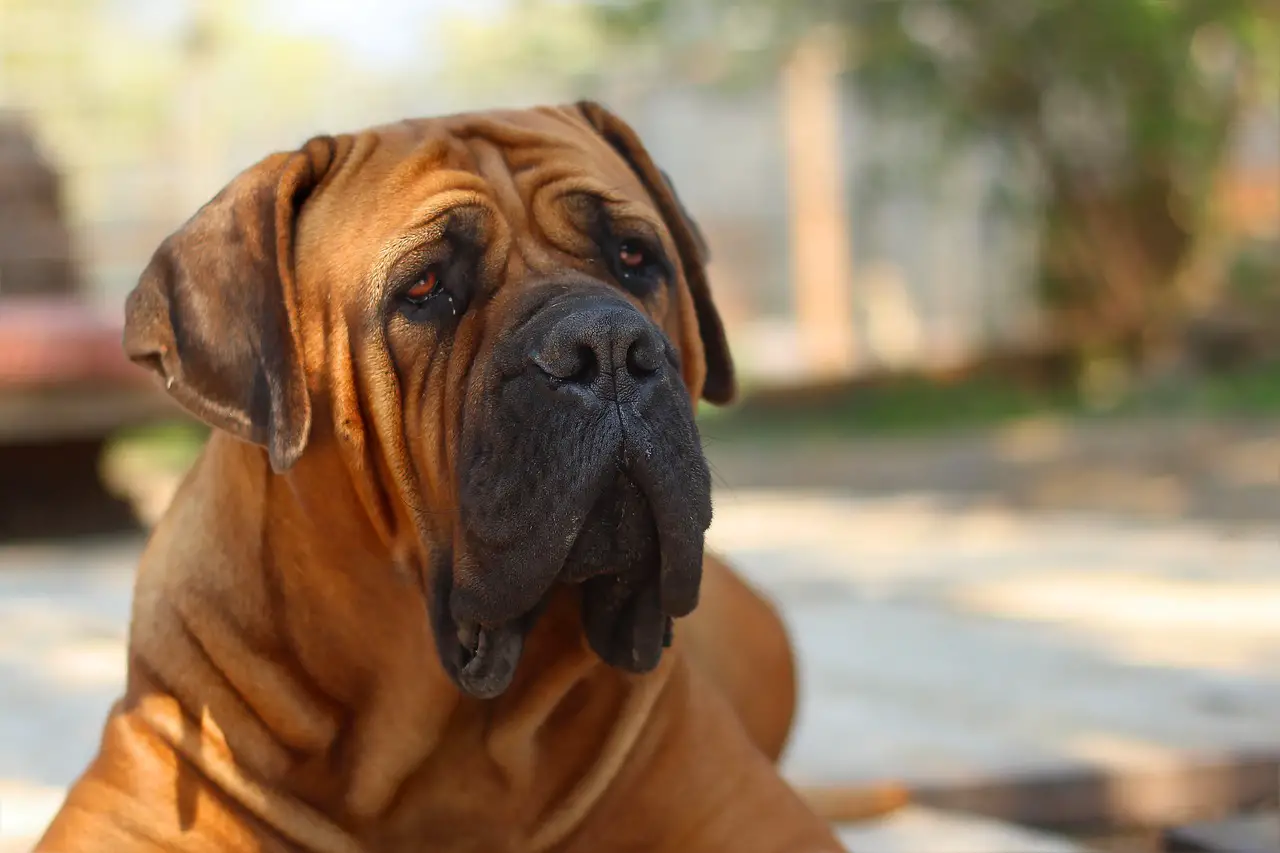Table of Contents
Can Dogs Get Coronavirus? FAQs for Mastiff Owners
 With the outbreak of the Coronavirus pandemic, people are quite worried about how to protect their families and themselves from this mysterious virus. But if you are a dog owner, it is quite natural to have several questions in your mind regarding the safety of your four-legged best friend. Let us clear out your confusion by addressing the questions that are bothering you.
With the outbreak of the Coronavirus pandemic, people are quite worried about how to protect their families and themselves from this mysterious virus. But if you are a dog owner, it is quite natural to have several questions in your mind regarding the safety of your four-legged best friend. Let us clear out your confusion by addressing the questions that are bothering you.
Can dogs contract the COVID-19 Coronavirus?
Yes and no. Although dogs can contract the Coronavirus, the most common type of Coronavirus in dogs is the Canine Respiratory Coronavirus. The current outbreak of COVID-19 Coronavirus may affect your dog as your pup may have a positive result from the test, but this virus does not cause any threat to your pup’s life. Having said that, it is better to keep a distance from your dog in case you suspect having the virus or the symptoms.
Many animals have resulted in positive in a COVID-19 test, but the disease is not believed to travel from animal-to-person. According to the World Health Organization, there is no proof or indication that your dog can spread the COVID-19 Coronavirus. However, in Hong Kong, a Pomeranian dog contracted Coronavirus from the owner who was suffering from the disease. For this reason, if you or any family member have symptoms of COVID-19, it is better to keep your Mastiff away from the infected person. This includes the infected person not feeding the pup, sharing food, kissing, petting, or playing with the dog.
Can dogs spread COVID-19?
Although the origin of COVID-19 Coronavirus is believed to be from a bat, there is no evidence that animals can spread this virus. Scientists are trying to find more about this mysterious virus. According to the World Health Organization, the COVID-19 virus primarily spreads through the droplets of an infected person sneezing, coughing, or even speaking. Your dog and other pets cannot spread the Coronavirus as it is believed to travel from one person to the other.
However, it is recommended that you wipe your dog’s coat and feet with a pet wipe every time your four-legged friend goes outside or comes inside the house. This is done to make sure if your dog gets in contact with the novel Coronavirus, there is no chance of your dog spreading it.
Can humans get coronavirus from dogs?
The chances of humans getting Coronavirus from their dogs is extremely low. According to the American Veterinary Medical Association (AVMA), the novel Coronavirus generally survives on flat surfaces like handles, taps, doorknobs, kitchen counters, etc. Your dog’s fur is not a smooth surface. Since the fur of dogs and cats are porous, the coat tends to trap the virus, and not transmit when the owner touches the pet. But this does not mean that you should not sanitize or wash your hands with soap after interacting with your dog who has been playing outside.
No matter how low the chances are, to make sure that you do not get any germs from your dog, it is better not to let anyone pet your dog when you are outside, and keep your dog indoors unless required otherwise.
How can I protect my dog from COVID-19?
Although there is no proper evidence that suggests that the COVID-19 Coronavirus can be harmful to your dog, it does not mean you should stop taking care of your dog’s hygiene. Especially when your dog gets in contact with a COVID-19 patient or comes home from outside, you need to properly clean your dog. To protect your dog from COVID-19, keep the following measures in mind:
- While taking your dog out on a walk, keep your four-legged friend at a six feet leash away from people and animals. Also do not let anyone pet or touch your dog.
- If you have come from outside, wash your hands for 20 seconds with soap after you enter your home and before you touch your dog or any other thing in the house. It is also a good practice to keep a small bottle of hand sanitizer in your pocket or car so you can use it before letting the dog greet you.
- If a family member gets infected with COVID-19 or shows symptoms of the disease, keep your pet away from the patient. Do not let the patient touch, hug, kiss, play, or share food with the dog.
- Do not let your dog lick a sick person who has signs of COVID-19.
- If you are the only caretaker of your dog and you suspect having the virus, ask a friend to walk your dog, feed him, and take care of your pup until you get better.
- It is better to stock up around 2 weeks’ supply of dog food. In case you get the symptoms, your dog will still have food to eat at home. Under no circumstances should you abandon your dog, no matter how scared you feel about the virus.
- Keep a pet-wipe or a pet-safe sanitizer near your door. Whenever your dog comes in from outside, clean your pup’s paws and fur.
- Although there is no evidence of the COVID-19 making your dog sick if you notice any health-related changes in your dog (such as decreased appetite, lethargy, body secretions, etc.) contact your vet as soon as you can.
Can I walk my dog?
The Centers for Disease Control and Prevention (CDC) suggests that while walking your dog, you need to make sure your dog is on a leash and is at a minimum of 6 feet distance from other people and their pets. But dogs do not understand social distancing, do they? The good news is that maintaining this distance will not be hard as the dog leash is generally 6 feet long. Also, it is better to avoid rush areas while you take your dog out on a walk. Instead of dog parks, take your dog to places that do not have many people or animals around. If you live in a crowded area, you can go out at an unusual time (too early or too late) when not a lot of people are outside.
With COVID-19 pandemic hitting all parts of the globe, different regions have a different curfew and social distancing rules. Before taking your dog for a walk, make sure you abide by the lockdown or curfew rules in your area, and adjust your dog-walking routine according to the local regulations. While you are walking with your dog, do not let anyone pet your dog. It is recommended that you carry a pocket-sized bottle of hand sanitizer with you, and once you reach home, wash your hands with soap for at least 20 seconds. Also, wipe your dog’s fur and paws with a pet-safe sanitizing wipe to make sure your dog is germ-free, and so is your home.
Do not use a face mask on your dog when you take him out on a walk. Your dog may find it difficult to breathe with a mask on. You can wear a mask yourself and avoid touching your eyes, nose, and mouth when outside.
Is there a COVID vaccine for dogs?
Currently, there is no COVID-19 vaccine for dogs or even humans. However, there are some other types of Coronaviruses that cause different diseases in dogs, such as the Canine Enteric Coronavirus (CCV). The Canine Enteric Coronavirus causes orange diarrhea in dogs leading to decreased appetite and extreme lethargy. These symptoms may clear up by themselves in a couple of days. As a puppy, your dog may have had a vaccination for Canine Coronavirus.
However, keep in mind that this Coronavirus vaccination strain is a completely different strain than the respiratory strain of Coronavirus and does not protect a dog from COVID-19. The good news is that there are no studies that suggest COVID-19 being a threat to your dog’s life.
What animals are affected by coronavirus diseases?
Scientists are still researching the impact of COVID-19 Coronavirus on animals. Although there are some previous coronavirus outbreaks, for instance MERS and SARS, that originated from animal sources such as the horseshoe bats and passed onto other animals before affecting humans, there is no study that shows that the COVID-19 Coronavirus can be a threat to your pet.
As per the CDC, COVID-19 Coronavirus generally spreads from person to person, but there have been instances where it spread from person to animal. In a New York zoo, a tiger was tested positive with the COVID-19, and it is believed that it contracted the virus from an infected zookeeper. There have been reports in Hong Kong and Belgium of a couple of dogs and cats contracting the virus. In most cases, the owner of the pet had the COVID-19 Coronavirus, from where the animal contracted the disease. According to some recent reports, apart from domestic cats, dogs, and a zoo tiger, the virus has been observed in monkeys, ferrets, camels, bats, horses, and cattle, as well.
Studies show that pet owners can transmit the virus to their pets when they share food, hug, or snuggle their pets. Also, when the infected pet-owners let their pets lick them, the animal is exposed to the virus. The good news is that the chances of animals passing the virus to humans is quite low. Also, there are no major health issues reported in animals after being infected with the COVID-19 Coronavirus.

